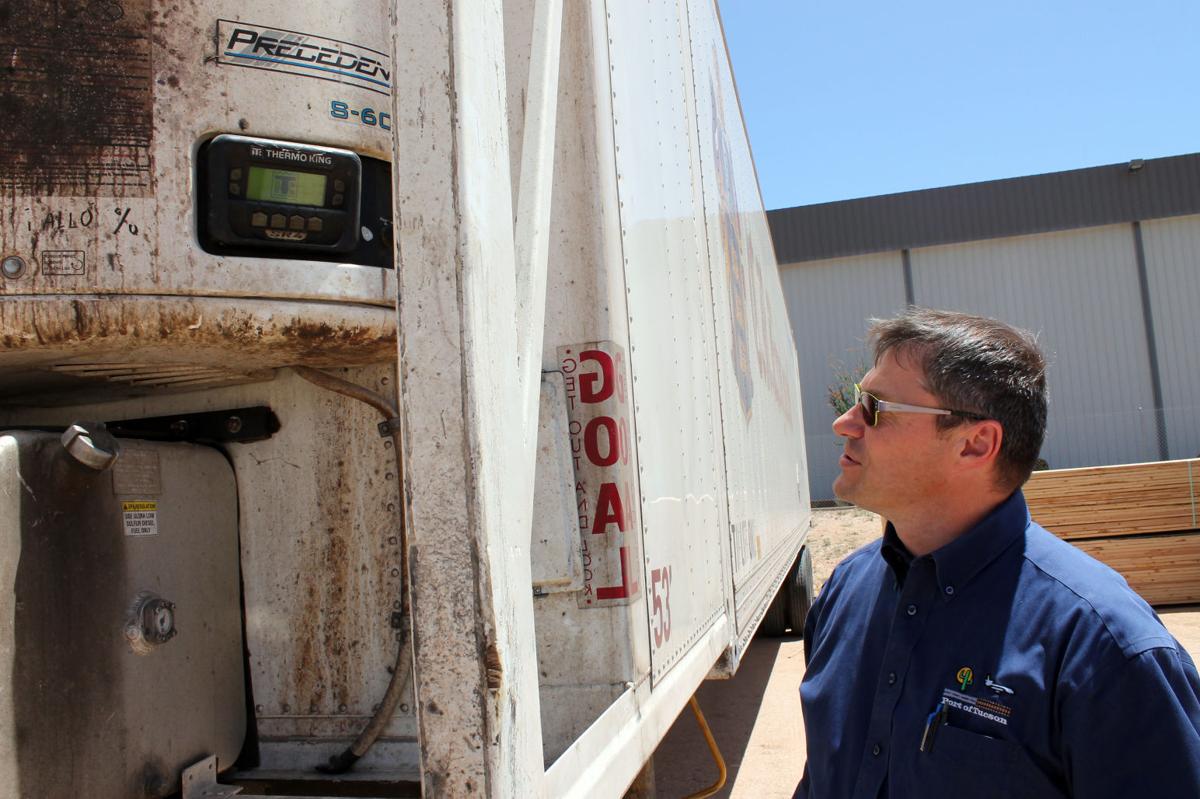The Port of Tucson is working to attract rail business from the Nogales produce industry, as a crisis looms in the trucking sector.
“The good thing about rail is that it’s steady, it’s predictable, it’s cost-effective,” said Stefan Baumann, director of business development for the port. “But it’s a new mode. They’ve been doing trucking for the last 40 years.”
Going against tradition is difficult in an industry that’s generally slow to adopt new things, said Matt Mandel, chairman of the Fresh Produce Association of the Americas.
“(But) over the last 10 years, with availability of other jobs and increased regulations on the trucking industry, it’s gotten to the point that truck availability seems to be decreasing every year,” he said. “With that, obviously you have to start looking at other options.”
The trucking industry faces a shortfall of about 240,000 drivers by 2020, according to the American Trucking Associations, an industry lobbying group.
Transportation concerns are already affecting the produce industry, with some growers already bypassing trucking — and the region — altogether, Mandel said.
“There’s several companies that have moved to growing melons in Central America because the ocean freight to get them to the United States is much more convenient than growing them in Mexico and shipping them by truck,” he said.
A full train can send the equivalent of about 300 truckloads of produce from Southern Arizona to the northeast in about five days, port officials said.
Some local companies are already shipping some produce by rail to the Midwest.
“Right now there is a direct line, nonstop, from Tucson to Chicago, and some people are taking advantage of that,” said Alejandro Canelos of Apache Produce Imports. “There’s a lot of potential there as a cost-effective alternative to traditional trucking.”
That potential is behind the Port of Tucson’s focus on the fresh produce industry, for both storage and shipping.
The port already has about 90,000 square feet of cold storage available, largely used by turkey processors, which sits pretty much empty when the produce season peaks in Mexico, Baumann said.
“We’re trying to work together with the food shippers and the warehousers and distributors down in Nogales, to tell them, ‘Whenever something hits, and they all overflow, they can use the Port of Tucson for that,’” he said.
The port is also building a 240,000-square-foot cold storage cross dock. The facility is designed to receive trucks with Mexican produce on the north side and directly load produce into boxcars on the south side of the building.
Risk and reward
Although the Port of Tucson and rail industry officials are actively courting the Nogales produce industry, there’s been some hesitation on both sides as they find ways to work together.
Port officials said they thought twice about moving beyond frozen storage and transport.
“Frozen is easy: You just freeze it down and you really don’t have to worry about it anymore. Chilled, fresh, is a bit more difficult,” Baumann said.
To make that transition easier, the port is inviting the Nogales produce industry to take over their buildings as needed, including the new cross dock facility.
The rail industry wants to work with the produce industry but doesn’t want to take any risk, Mandel said, which may be one of the roadblocks. He said they have already run into problems when trying to ship produce.
“Due to liability concerns, they will not let that product be loaded on their cars unless there’s a separate insurance policy carried by the shipper,” he said. “Just because of the highly perishable nature of the products.”
Some in the industry could see that as a red flag, Mandel said, but he thinks the opportunity of shipping by rail is worth taking a risk.
“My company, SunFed, is looking into the feasibility of it to try certain items,” Mandel said. “I don’t think rail will ever completely replace trucking, but if we can get to the point where it’s a viable option it will make the supply chain run more smoothly and would be a cost benefit for everyone involved.”
The key to success and efficiency is reaching critical mass, having dedicated trains loaded with produce and nothing else, said Port of Tucson officials.
But they know they have to start slowly and hope the produce industry is ready to take the chance.
“There are 1,500 truckloads a day crossing into Nogales during peak season,” Baumann said. “We only need 300 of them and we can build a whole train.”





